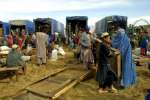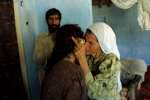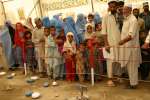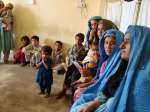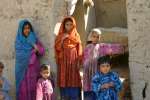- Text size
 |
|  |
|  |
| 
- عربي
UNHCR urges humane treatment for refugees, urges collective action on issue
News Stories, 25 August 2015
GENEVA, Aug 25 (UNHCR) – The UN refugee agency stressed on Tuesday that it was working closely with the Serb authorities to help meet the needs of more than 10,000 refugees and others who have arrived in Serbia in recent days following dramatic scenes at the Greek border with Former Yugoslav Republic of Macedonia.
At the Greece-FYR Macedonia border itself -- reported calm after chaotic scenes late last week -- people are now crossing in groups of up to 300-400 and then travelling onwards by train or bus to Serbia.
"Currently, we anticipate these arrivals continuing over the next few days at a rate of up to 3,000 people per day," UNHCR spokesperson Melissa Fleming told a press briefing in Geneva.
She added that UNHCR was still concerned about the conditions for people making this journey, many of whom are from countries affected by on-going conflicts, such as Syria and Afghanistan.
"They are often physically exhausted and psychologically traumatized, and in need of humanitarian and medical assistance, especially the most vulnerable -- the sick, pregnant women and elderly. It is vital these people are treated humanely and essential assistance provided," she said.
UNHCR emphasised that this included responding to basic needs but also fully respecting the dignity and human rights of refugees, asylum-seekers and migrants.
"While understanding legitimate concerns facing countries in the region due to increasing arrivals of asylum-seekers and migrants, UNHCR appeals to the Governments involved to implement border management measures with humanity and in accordance with their international obligations. Family unity and protection of persons with specific needs must be upheld," Fleming added.
UNHCR itself has deployed staff in key locations including border areas to help address some of the protection needs. In coordination with the authorities and together with partners, it has distributed food and water, and provided some shelters and sleeping mats and blankets.
"We are ready to further support the Governments involved," the spokesperson said, adding: "More broadly, UNHCR is concerned about the sustainability of this situation."
She reiterated that refugees and migrants making their way from Greece into the Western Balkans were a symptom of a much wider problem of today's record levels of forced displacement from conflicts in Syria and elsewhere.
UNHCR has repeatedly said it is clear that this problem cannot be solved by any one country working alone, and that a comprehensive European response was urgently required based on solidarity and equal sharing of the burden.
"All European countries and the EU must act together and help those countries whose capacities are already overstretched such as Greece, Former Yugoslav Republic of Macedonia and Serbia. This includes capacity support, and support for equitable redistribution of refugees and asylum seekers across the EU," Fleming noted.
Beyond the EU's immediate borders, and in the region surrounding Syria the number of refugees has continued to rise following new registrations in Turkey and now stands at 4,089,023 people.
To prevent a situation in which more people feel compelled to move on from these countries towards Europe and elsewhere, it is essential that support for countries of first asylum is stepped up.
However, the UN refugee agency has noted that the current Syria situation Regional Refugee and Resilience Plan (3RP) is just 33 per cent funded.










